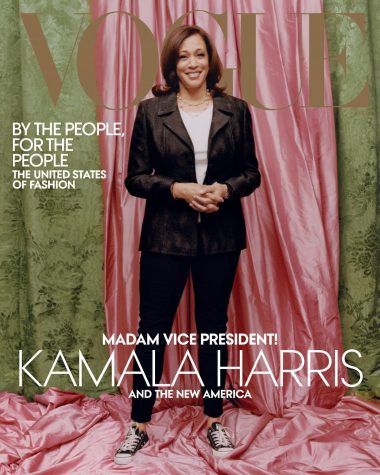OPINION | Politics should focus on solidarity, not representation

On Jan. 10, Vogue magazine placed Vice President Kamala Harris on the cover of its latest issue. The photo, shot by photographer Tyler Mitchell, who is known for having shot other notable figures, such as Beyonce, featured the vice president in a studio setting with warm lighting. Sporting a jacket, dark pants, her signature pearls and a casual touch in the form of converse, Harris was posed in front of a background referencing Alpha Kappa Alpha sorority, of which she was a member.
The seemingly accessible and well-curated cover photo was met, however, with sharp backlash. Evidently, Vogue had switched out the agreed upon cover photo with a different one. Instead of the photo placed on the physical cover, a photo of Harris power-posing in a light blue pantsuit was expected to be debuted. Considering Harris’ status as the first Black woman vice president and Vogue’s controversial handling of race, this may have come off as disrespectful.
However, those who propagated this outrage are misguided in their efforts to improve treatment of Black women in America. Harris is a wealthy, influential and powerful woman. Even more to the point, the situation doesn’t involve workplace dynamics, living conditions or violence, but a mere public relations stunt. The surrounding discourse is hardly more than political theater. The manufactured outrage surrounding this “controversy” hardly makes sense in lieu of who Harris is: she is soon to be the second most powerful individual in the country, and this hardly damages her platform.
Asserting that Harris’ experience is somehow indicative of a common pattern is myopic in regards to depth of analysis. While the dismissive treatment she received could definitely be attributed to her identity as a woman of color, it still unfolded in the context of an elite institution that caters and uplifts already powerful individuals. On top of that, it also distracts from actual criticism over her political history and propagates an unhealthy parasocial relationship between her and her supporters.
Almost anyone who has followed Twitter politics in the last few years can remember the negative connotation that “Bernie Bros,” Senator Bernie Sanders’ horde of supporters, received. And yet, Kamala’s makeshift cult of personality, referred to as “KHive,” received glowing reviews from the same outlets that defamed “Bernie Bros.”
As a largely moderate Democrat with a pattern of inconsistency, Harris receives major backing, whether in official or casual capacities, from media sites, wealthy Americans and establishment political organizations alike.
Ultimately, one must recognize that political representation and “accessible” candidates can only go so far. The status quo in American politics, which rewards vague commitments like “Yes we can” over “snappy” policy demands like “Defund the police,” does not serve the general public. Furthermore, the assumption of American identity politics, which ascertains that an individual of a certain identity will inherently be a benefactor to their community and hails minority tokenization as “progress,” has clear limits.
Take Harris as an example: as a prosecutor, she persistently propagated the prison-industrial complex which disproportionately harms Black people, choosing to prosecute parents for truancy and nonviolent marijuana charges, even as she let wealthy citizens off the hook.
Especially in the face of the COVID-19 pandemic’s pressing issues, the American public must transition to holding politicians accountable and severing whatever personal connection they feel towards them. When politicians give grand declarations yet fail to commit or advocate for policies only to be re-elected, how are voters to maintain their trust? Only by advocating for politicians and policies that are divorced from corporate interests and serve the American public can electoral politics in this country move forward.
Your donation will support the student journalists of Tulane University. Your contribution will allow us to purchase equipment and cover our annual website hosting costs.


